The love of power corrupts, the power of love falters or fails. The essence of Wagner’s Ring of the Nibelung is also what Graham Vick communicated so stunningly in many of his unforgettable productions with his Birmingham Opera Company (Khovanskygate in a big top and Lady Macbeth of Mtsensk in a disused nightclub were perhaps the most revelatory experiences of my opera-going life to date).
This spring he embarked on RhineGold, unusual venue then to be confirmed, but fell ill with Covid and died, aged only 67, on 17 July – the biggest personal shock of the time for many of us. Richard Willacy, BOC's CEO and Vick's associate director for many years, took up the challenge. The ensemble Vick nurtured, including a full-force City of Birmingham Symphony Orchestra under brilliant young Alpesh Chauhan, born in the city where he still lives and BOC’s new Music Director, honoured his memory to the hilt by making sure that the quality of the work and the intensity of the experience, music-drama at its best, came first.
An authentic Vick RhineGold would not have taken place in Symphony Hall; the real experience of previous ventures was standing in among the singers, moving around, marshalled by Vick and his partner, choreographer Ron Howell, being shoved out of the way by hordes of policemen pouring out of a van (Khovanskygate) or threatened by humanoid rats (Lady Macbeth). But the lighting by Vick’s regular collaborator for decades Matthew Richardson and the designs by Stuart Nunn put across the essence at the highest level. 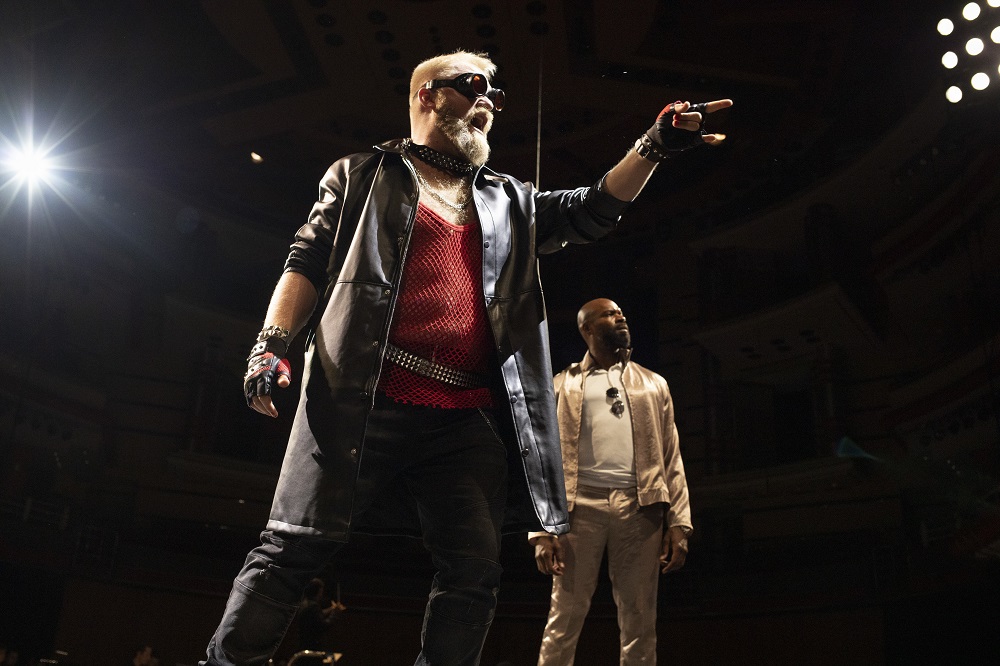 And since the concert hall’s acoustics are the best in the UK, at least for orchestral music, the luxury of full orchestra, four harps and nine horns (four doubling Wagner tubas) was equal to what you experience in the Wagner Days of Ivan Fischer in Budapest’s MUPA Hall – that’s to say, the clearest and most impactful orchestral textures for Wagner anywhere in the world. Woodwind slithers and chord-colourings that might pass you by if they came from the orchestra pit make for rich, kaleidoscopic textures throughout and the atmospheric moments – especially the gods growing old from the absence of Freia’s apples of youth – always cast a spell.
And since the concert hall’s acoustics are the best in the UK, at least for orchestral music, the luxury of full orchestra, four harps and nine horns (four doubling Wagner tubas) was equal to what you experience in the Wagner Days of Ivan Fischer in Budapest’s MUPA Hall – that’s to say, the clearest and most impactful orchestral textures for Wagner anywhere in the world. Woodwind slithers and chord-colourings that might pass you by if they came from the orchestra pit make for rich, kaleidoscopic textures throughout and the atmospheric moments – especially the gods growing old from the absence of Freia’s apples of youth – always cast a spell.
As for the cast, it’s not incidental that nine of its number are British and American black or Asian singers; Vick, like Peter Sellars, was way ahead of the current curve in making sure the performers reflected an ideal mix in an ideal audience (still some way to go on that front, but we’re getting there). Vitally there were no weak links, though Symphony Hall is not an ideal venue for getting all the words of Jeremy Sams’s brilliant translation across, and there were no supertitles to help. Supreme in that respect was Brendan Gunnell’s Loge (pictured above with Eric Greene's Wotan), as good a devious demi-god as I’ve seen anywhere, a heroic edge to the tenor voice bringing beauty to passages like the one in which he sings of women’s beauty on earth as a thing not to be traded for gold. Fire implicit in the red string vest and glasses, leathers setting him apart, a brilliant thinker but one not always in control of the game, this Loge made an uneasy ring-master when centre stage (a large circular space was thrust out into the front half of the stalls, the orchestra in its usual place but behind). 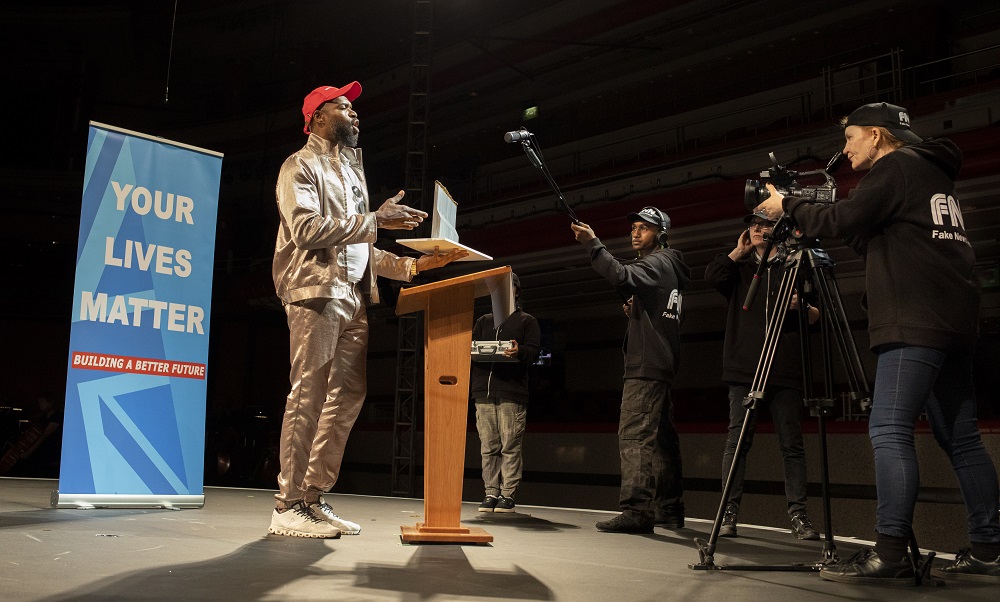 Keel Watson’s Valhalla-building giant Fasolt, Andrew Slater’s more prosaic and brutal Fafner and John-Colyn Gyeantey as put-upon Nibelung Mime also worked excellently with the text. The sound and the physical meaning were more to the point with Eric Greene’s chief god Wotan, delivering his most sonorous hypocritical nobilities to campaign cameras (pictured above); the ultimate moment of Wotan’s “big idea” (the sword, not revealed until the next Ring opera) was perhaps the most resonant and impactful I’ve heard since Norman Bailey’s godlike delivery. Wotan has to be as hugely charismatic as this. Chrystal E Williams, Vick’s Katerina Izmailova (or “Wife”), gave us Fricka as a real, concerned if petted consort (none of the women come off well in RhineGold); the vulnerable Freia, ransom for the giants’ non-payment, made more of an impact than usual in Francesca Chiejina’s soaring lyricism. If BOC move on to Valkyrie, she would surely make a good Sieglinde, and what little we get to hear of empty-valour Froh gave hopes of Amar Muchhala as her Siegmund. There was further vocal ring from Byron Jackson’s blusterous cheerleader Donner.
Keel Watson’s Valhalla-building giant Fasolt, Andrew Slater’s more prosaic and brutal Fafner and John-Colyn Gyeantey as put-upon Nibelung Mime also worked excellently with the text. The sound and the physical meaning were more to the point with Eric Greene’s chief god Wotan, delivering his most sonorous hypocritical nobilities to campaign cameras (pictured above); the ultimate moment of Wotan’s “big idea” (the sword, not revealed until the next Ring opera) was perhaps the most resonant and impactful I’ve heard since Norman Bailey’s godlike delivery. Wotan has to be as hugely charismatic as this. Chrystal E Williams, Vick’s Katerina Izmailova (or “Wife”), gave us Fricka as a real, concerned if petted consort (none of the women come off well in RhineGold); the vulnerable Freia, ransom for the giants’ non-payment, made more of an impact than usual in Francesca Chiejina’s soaring lyricism. If BOC move on to Valkyrie, she would surely make a good Sieglinde, and what little we get to hear of empty-valour Froh gave hopes of Amar Muchhala as her Siegmund. There was further vocal ring from Byron Jackson’s blusterous cheerleader Donner. 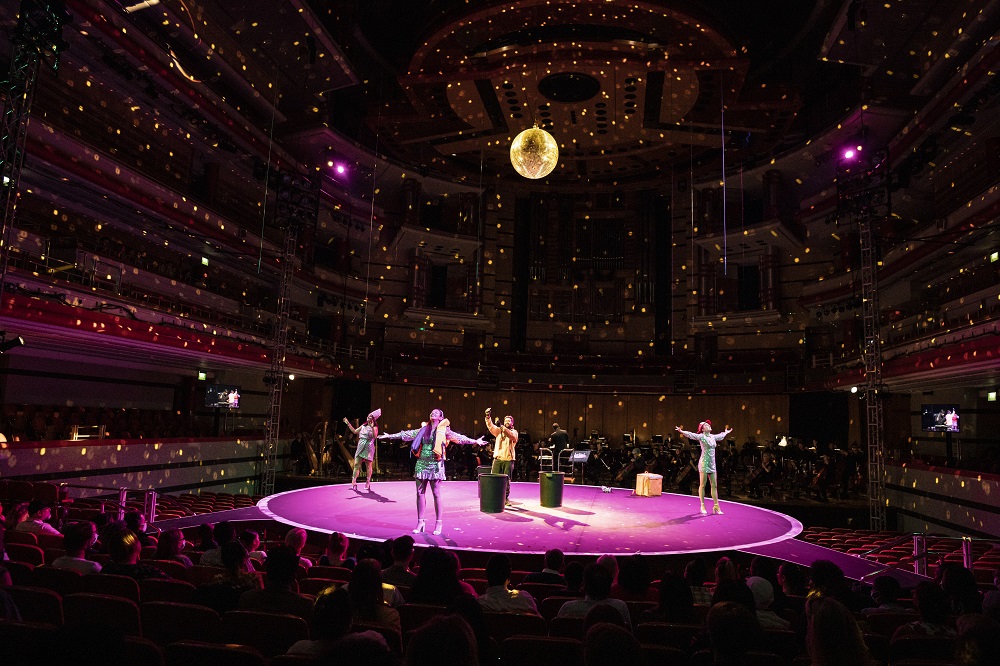 The most against-the grain casting was a soprano, Gweneth-Ann Rand, as Erda - usually a contralto, but the poise was all here - and lyric baritone Ross Ramgobin as Alberich, the role which is the biggest sing of the opera. Usually we get a strong bass-baritone to portray the Nibelung thief who renounces love as a scary villain with the blackest tones, but clearly that wasn’t Vick’s conception – this Alberich is an outsider, one of those underpaid food-delivery cyclists who stumbles across the “Rhine Girls” (Zoe Drummond, Felicity Buckland and Georgia Mae Bishop, lustrous and convincing) who protect the gold for the powerful. Gold comes out of the bins they occupy; a giant glitter ball effects the awe of the treasure.
The most against-the grain casting was a soprano, Gweneth-Ann Rand, as Erda - usually a contralto, but the poise was all here - and lyric baritone Ross Ramgobin as Alberich, the role which is the biggest sing of the opera. Usually we get a strong bass-baritone to portray the Nibelung thief who renounces love as a scary villain with the blackest tones, but clearly that wasn’t Vick’s conception – this Alberich is an outsider, one of those underpaid food-delivery cyclists who stumbles across the “Rhine Girls” (Zoe Drummond, Felicity Buckland and Georgia Mae Bishop, lustrous and convincing) who protect the gold for the powerful. Gold comes out of the bins they occupy; a giant glitter ball effects the awe of the treasure.
Later the Nibelung whom Alberich has enslaved bring up the gold in black washing-up bowls and place it around the stage to the most effective crescendo with the most overwhelming climax I’ve heard from an orchestra in 18 months – there are more to come in Chauhan’s superbly paced interpretation, including the big set-piece of Alberich’s curse, which Ramgobin pulls off without strain, leaving the orchestra to do the real steely cut (I loved the “fuck you”s to Wotan and Loge as he storms off). The giants’ measuring-up of the gold against Freia is also the most effectively done staging of that scene of humiliation I’ve seen. 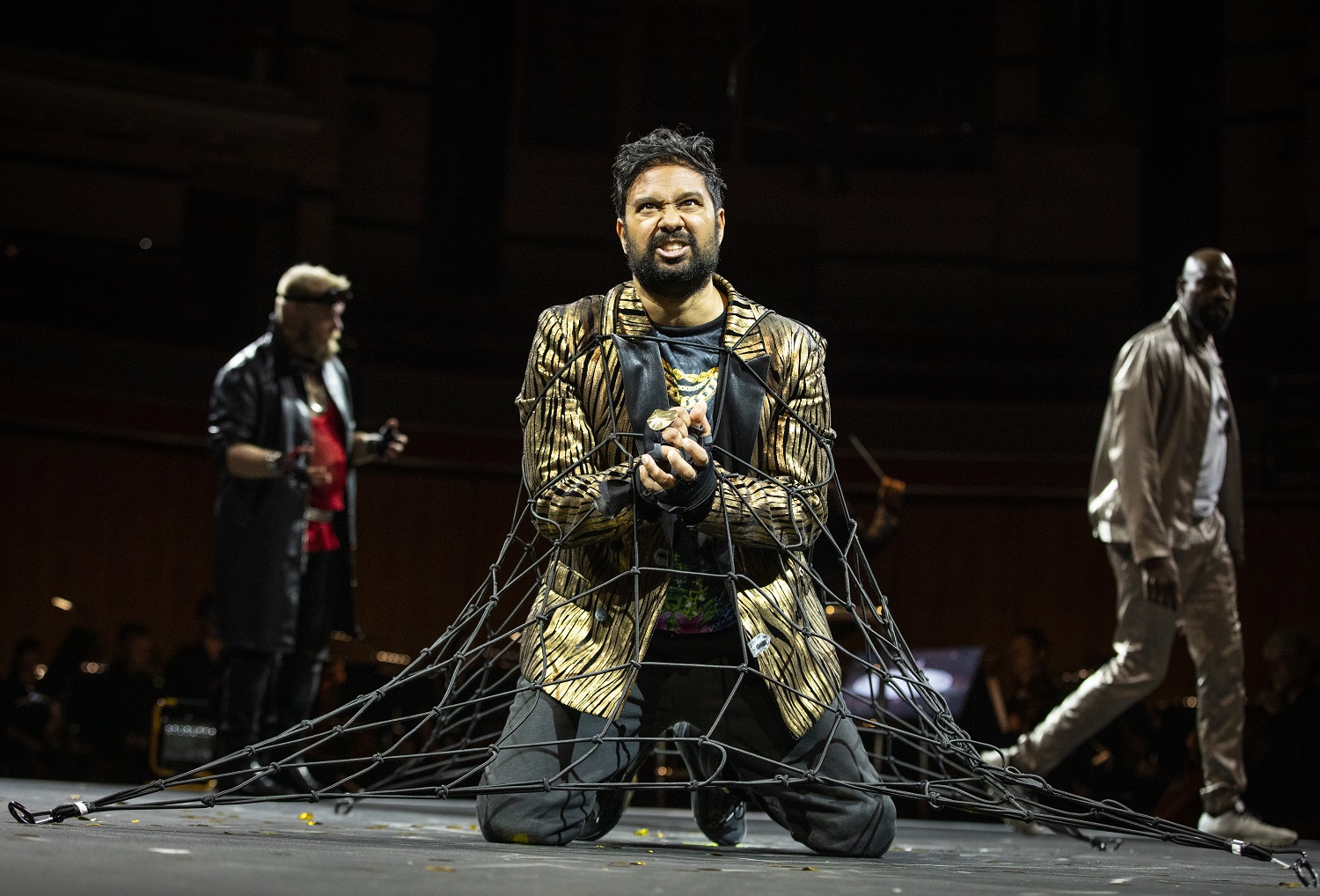 So often the “preliminary evening” of Wagner’s tetralogy is a box of stage tricks, but everything here is done by the performers with a handful of props. The 19 volunteer actors get to make their mark in the interludes; I’m not always sure what the message is, other than that in the battle against exploitation, “Us” can turn into “Them” (the T-shirts have both logos). What I do know is that the final idea is superb: the rainbow bridge over which the vainglorious gods go to their pile in the sky, ignorant of their doom, becomes a gulf as seven helmeted cyclists, each in a colour of the spectrum, crawl towards the unheeding power-wielders. A suitably strong stage picture against the overwhelming pomp of the orchestra. Vick would have been proud of his company: he has left behind not so much a legacy as a challenge to create the ideal in the future.
So often the “preliminary evening” of Wagner’s tetralogy is a box of stage tricks, but everything here is done by the performers with a handful of props. The 19 volunteer actors get to make their mark in the interludes; I’m not always sure what the message is, other than that in the battle against exploitation, “Us” can turn into “Them” (the T-shirts have both logos). What I do know is that the final idea is superb: the rainbow bridge over which the vainglorious gods go to their pile in the sky, ignorant of their doom, becomes a gulf as seven helmeted cyclists, each in a colour of the spectrum, crawl towards the unheeding power-wielders. A suitably strong stage picture against the overwhelming pomp of the orchestra. Vick would have been proud of his company: he has left behind not so much a legacy as a challenge to create the ideal in the future.
- theartsdesk will run a range of tributes to Graham Vick from colleagues early next week
- More opera reviews on theartsdesk

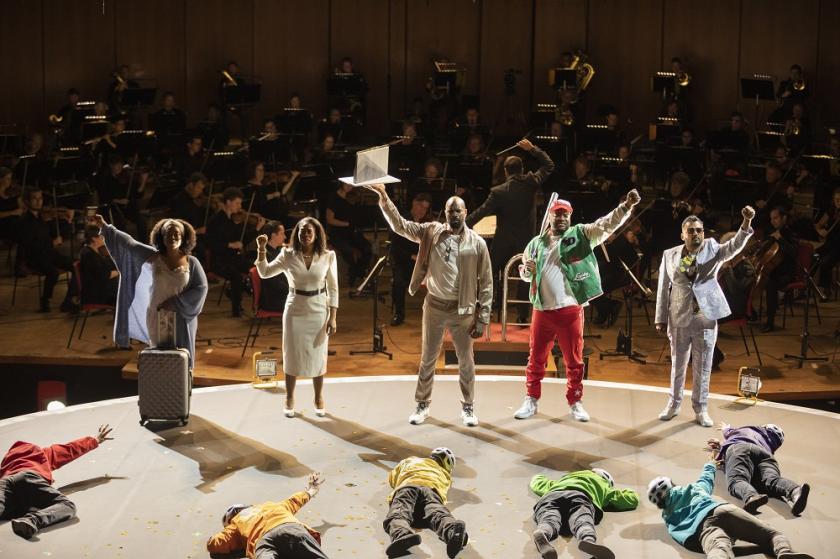












Add comment